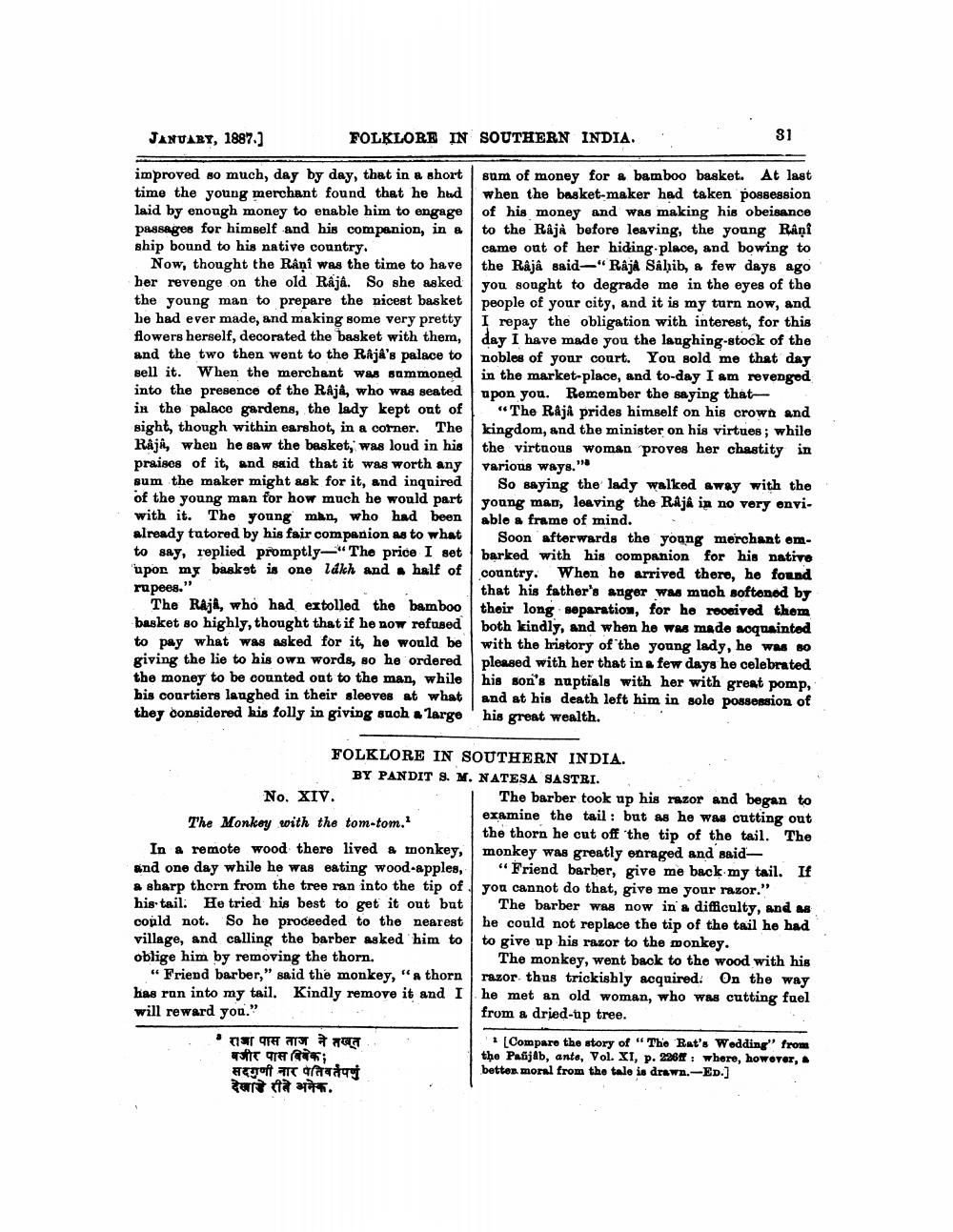________________
JANUARY, 1887.]
improved so much, day by day, that in a short time the young merchant found that he had laid by enough money to enable him to engage passages for himself and his companion, in a ship bound to his native country.
Now, thought the Rânî was the time to have her revenge on the old Raja. So she asked the young man to prepare the nicest basket he had ever made, and making some very pretty flowers herself, decorated the basket with them, and the two then went to the Raja's palace to sell it. When the merchant was summoned into the presence of the Raja, who was seated in the palace gardens, the lady kept out of sight, though within earshot, in a corner. The Raja, when he saw the basket, was loud in his praises of it, and said that it was worth any sum the maker might ask for it, and inquired of the young man for how much he would part with it. The young man, who had been already tutored by his fair companion as to what to say, replied promptly-"The price I set upon my basket is one lakh and a half of rupees."
The Raja, who had extolled the bamboo basket so highly, thought that if he now refused to pay what was asked for it, he would be giving the lie to his own words, so he ordered the money to be counted out to the man, while his courtiers laughed in their sleeves at what they considered his folly in giving such a large
FOLKLORE IN SOUTHERN INDIA.
No. XIV.
The Monkey with the tom-tom.1
In a remote wood there lived a monkey, and one day while he was eating wood-apples, a sharp thern from the tree ran into the tip of his tail. He tried his best to get it out but could not. So he proceeded to the nearest village, and calling the barber asked him to oblige him by removing the thorn.
"Friend barber," said the monkey, "a thorn has run into my tail. Kindly remove it and I will reward you."
FOLKLORE IN SOUTHERN INDIA. BY PANDIT S. M. NATESA SASTRI.
राजा पास ताज ने तख्त बजीर पास बिबेक; सदगुणी नार पतिवर्तपणुं देखाडे रीते अनेक.
81
sum of money for a bamboo basket. At last when the basket-maker had taken possession of his money and was making his obeisance to the Raja before leaving, the young Râni came out of her hiding place, and bowing to the Râjâ said-"Raja Sahib, a few days ago you sought to degrade me in the eyes of the people of your city, and it is my turn now, and I repay the obligation with interest, for this day I have made you the laughing-stock of the nobles of your court. You sold me that day in the market-place, and to-day I am revenged upon you. Remember the saying that
"The Raja prides himself on his crown and kingdom, and the minister on his virtues; while the virtuous woman proves her chastity in various ways."
118
So saying the lady walked away with the young man, leaving the Raja in no very enviable a frame of mind.
Soon afterwards the young merchant embarked with his companion for his native country. When he arrived there, he found that his father's anger was much softened by their long separation, for he received them both kindly, and when he was made acquainted with the history of the young lady, he was so pleased with her that in a few days he celebrated his son's nuptials with her with great pomp, and at his death left him in sole possession of his great wealth.
The barber took up his razor and began to examine the tail: but as he was cutting out the thorn he cut off the tip of the tail. The monkey was greatly enraged and said
"Friend barber, give me back my tail. If you cannot do that, give me your razor."
The barber was now in a difficulty, and as he could not replace the tip of the tail he had to give up his razor to the monkey.
The monkey, went back to the wood with his razor thus trickishly acquired. On the way he met an old woman, who was cutting fuel from a dried-up tree.
1 [Compare the story of "The Bat's Wedding" from the Pañjab, ante, Vol. XI, p. 226ff: where, however, a better moral from the tale is drawn.-ED.]




